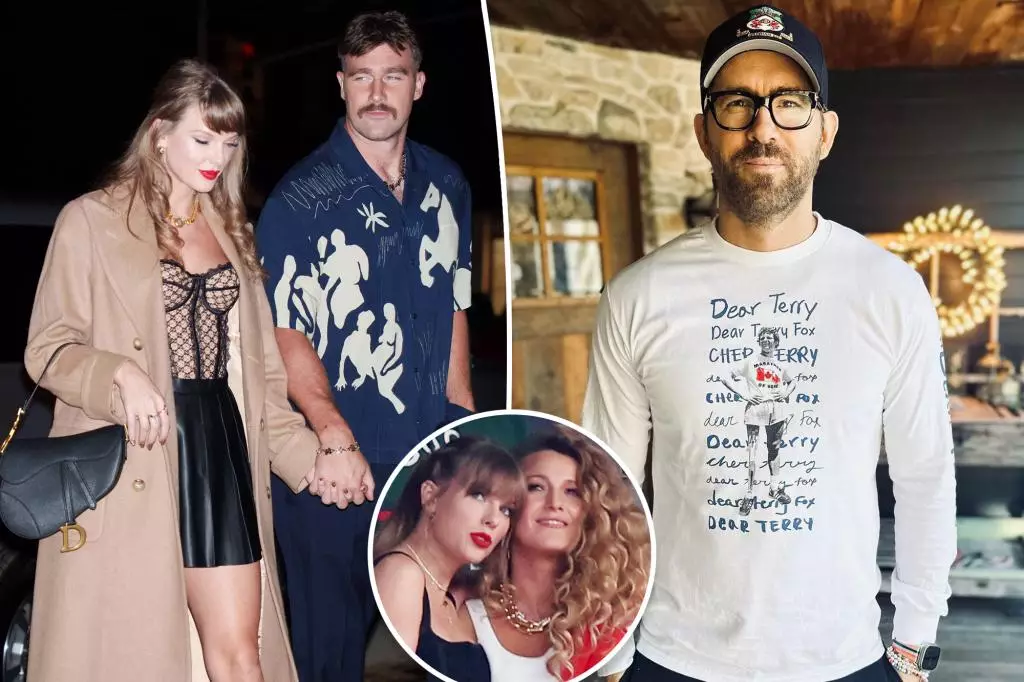In the realm of Hollywood relationships, social media presents a double-edged sword. It can be a platform for celebration, showcasing love stories and friendships, but it can also become a battlefield where alliances are tested and friendships scrutinized. Taylor Swift’s devoted fanbase, the Swifties, have developed a keen intuition for relationship dynamics, making them vigilant observers of any shifts in the digital sphere. Recently, an intriguing development caught their sharp eyes: Travis Kelce’s unexpected decision to unfollow Ryan Reynolds on Instagram, sparking speculation and commentary.
What’s Behind the Unfollow?
The unfollowing incident, noted by an eagle-eyed Reddit user, appears trivial on the surface; however, it could signify deeper rifts. Kelce, the Kansas City Chiefs tight end, had previously followed Reynolds, whose long-standing friendship with Swift has often placed him at the center of her social circle. Fans quickly correlated this newfound distance with rumors swirling around Swift’s connections to Blake Lively, Reynolds’ wife, drawing attention to a potential fallout that extends beyond mere friendship. It prompts the question: Could social media behavior decipher the genuine status of relationships in a world where appearances can so easily be manipulated?
Swift’s Circle: The Celebrity Web
Ryan Reynolds isn’t just another celebrity in Swift’s orbit; he’s part of a close-knit circle that has interwoven over the years. Swift’s friendships often play a pivotal role in her romantic relationships, acting as a barometer of her emotional state. The bond between Swift and Reynolds, bolstered by Lively’s presence, had previously showcased a harmonious blend of personal and social interactions, including double dates and public support. Yet, the enigma of their current situation reflects the fragility of such connections, especially given the heightened scrutiny they face.
Fans are left to dissect the complexities of these friendships, accentuated by Reynolds’ own familial references in Swift’s lyrical narrative. The notion that personal lives are inextricably linked to public personas illustrates how intertwined these relationships can be, and when conflicts arise, the ramifications echo loudly across social media platforms.
The Personal and the Professional: A Fine Line
What complicates this narrative further is the recent legal drama surrounding Lively’s project, “It Ends With Us,” which seemingly drew Swift into the fray. Allegations of feeling “used” and the circulating gossip highlight how intertwined personal and professional lives can devolve into chaos. Swift’s reported feelings about being dragged into the lawsuit underscore the potential pitfalls of being part of such a tightly-knit celebrity community where each action can provoke a tidal wave of consequence.
Amid this turmoil, one has to wonder how the nature of celebrity and public perception influences individual choices. The way Kelce’s unfollow of Reynolds has set the internet abuzz reveals not only a fascination with celebrity drama but also an inherent strategy among celebrities to curate their online relationships. Swift’s supporters are quick to analyze these developments, believing they hint at larger issues at play, fostering an environment where nothing is left unexamined.
In an age where online interactions can dictate the course of personal relationships, the unfollowing incident between Kelce and Reynolds is a vivid reminder of how swiftly the tide can turn, illustrating the challenges of maintaining friendships in an increasingly public and scrutinized world. The world of Swifties thrives on such intrigue, revealing a landscape where every click and like carries weight beyond immediate recognition.

